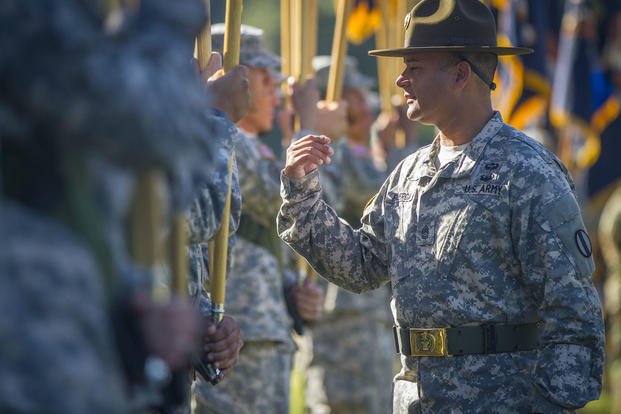Arriving at base is the moment you've been waiting for. It's the point where your life, as you know it, is now over. From this moment on, everything you do, everything you say and sometimes (it seems) everything you think belong to the military.
Basic training drill instructors aren't really psychic. (I don't think.) However, they've seen a thousand kids just like you, and they know how you feel. They know how you think, and often they will head you off at the pass. If you're hungry, they know it. If you're tired, they know it. If you're scared, they know it (and will take advantage of it for their purposes).
What is their purpose? You may be tempted to believe that their purpose in life is to make you miserable. While they do a very good job at this, that's not their goal. Their goal is to "knock the civilian out of you." What you say, how you think, how you act is no longer your business. It's now the business of the United States military and -- through them -- your drill instructors.
Tip: Although the Army calls their drill instructors drill sergeants (and each branch uses a different term for its drill instructors), I refer to them as drill instructors here.
The Big Arrival
Your plane will land at a designated airport, and you'll be instructed to pick up your checked bags (if any) and make your way to a designated area. This place is usually in the airport, such as the USO (United Service Organizations) Lounge, where a noncommissioned officer will meet you. Here, you'll wait until the basic training bus arrives. Your wait may be a few minutes, or it may be a couple of hours. The USO attendant isn't going to call for the bus until enough new recruits are waiting to fill it up.
Bus to Basic: In-Processing
When your bus to basic arrives, you'll meet a drill instructor for the first time. This person probably won't be "your" drill instructor, just one who has been detailed to get the new recruits to the base and give them a brief introduction to their new lifestyle.
This meeting will not be pleasant. Don't expect the instructor to walk up to you, shake your hand and kindly welcome you to the military. She will march smartly up to your group, stop and then suddenly begin screaming at you to get in line at the door. A few people in your group will not move fast enough to satisfy the instructor and will be rewarded with her personal attention (not pretty).
After everyone is lined up, the instructor will give a short speech, welcoming you to basic training. It doesn't really matter what the instructor says at this point; what she really means is, "You're mine now, maggot!"
After you arrive at basic training and the drill instructor is tired of playing games (see the sidebar), you'll be lined up in front of an in-processing building.
In-processing is nothing more than turning in the packet your recruiter gave you and filling out around 7,000,000 forms. Some believe the military runs on its stomach, but I firmly believe it runs on paperwork.
Tip: In the military, your Social Security number is your military serial number. In basic training, you'll write your Social Security number on every single form you complete. It's a good idea to have this number memorized before you leave for basic training.
Games Instructor(s) Like to Play
Many instructors like to start playing their games right there at the airport.
Bus boarding: One favorite instructor game is called, "get on the bus/get off the bus." When you are ordered to get on the bus, you're expected to board the bus quickly and quietly and sit down without hesitation or confusion. Of course, it never works this way, so the instructor may (loudly) order everyone to get off the bus.
After everyone is back in formation, the instructor spends a few minutes describing your bad habits and the bad habits of your ancestors and then orders everyone to board the bus again. This game continues until everyone can board the bus quickly, quietly and efficiently.
Entering/exiting the barracks: You probably won't get to play this game until a little later in the day. At some point during this first day, in-processing will be complete, and it will be time to retire to the barracks to unpack and enjoy a good night's sleep.
Your group is expected to enter the barracks quietly, quickly and efficiently. I can guarantee that won't happen the first time. So the instructor will order everyone out, line them up and give everyone the opportunity to try it again. This game continues until the instructor is satisfied.
Now this doesn't sound too bad, except when you realize that you're carrying your luggage (aren't you glad you packed light?) and that many barracks' bays are on the fourth floor (sorry, no elevators in basic training).
Fire drill: This game is the same as the entering/exiting the barracks game, except it usually occurs after Day 1. The instructor enters the barracks, looks around for a second and then suddenly yells, "Fire!"
Recruits must exit the barracks, quickly, quietly and efficiently and then form up (line up in military formation) on the drill pad outside of the barracks. Repeat as necessary.
What did you say? Drill instructors will never pass a chance to prove that they're smarter than you. In my experience, some drill instructors are dumber than dirt, but the rules are such that they always prove to be smarter than unseasoned recruits.
After a while, the instructor will get tired of playing games, and everyone will (finally) board the bus to basic training. This is not a tour bus. Throughout the trip, make sure that you sit still and don't talk with anyone. Remember, that nice drill instructor will be aboard as well, just looking for an opportunity to further instruct you in proper basic training etiquette.
It's important to remember at this point that this type of specialized attention only occurs during basic training. When I first arrived at basic training, I remember thinking, "Oh wow! I signed up for four years of this???" That was a scary, scary thought.
Initial in-processing will take between two and three hours. Except for Army recruits, once it's complete, you'll be turned over to your permanent drill instructor, who will take you to the barracks and get you settled in.
Army Reception
You won't start Army basic training immediately upon arrival. First, you have to wait your turn in a special program called reception. Believe it or not, for many, this reception is the hardest part of Army basic training. Desert Shield/Desert Storm proved that much of war for the Army is "hurry up and wait." The United States moved thousands of Army troops and tons of equipment, weapons, and ammunition in a few weeks, and then the deployed troops waited for months and months for the first sign of action. The Reception Battalion gives you a chance to practice waiting ... and waiting ... and waiting. When you get bored with waiting, you'll be allowed to practice more waiting. If efficiently organized, the actual processing that goes on at the Reception Battalion would probably take 8-10 hours. You get to do it the Army way, however, which means doing just a little bit of "processing" each day for anywhere between one and three weeks.
The good news is that while you're at reception, the drill sergeants assigned to watch over you don't yell at you very much. At least they don't for the first half of your stay while you're still running around everywhere wearing your official Army physical training (PT) sweats. (You won't get your uniforms until several days into processing.) It's almost as if they don't notice you until you're just about ready to depart for official boot camp. Then they seem to wake up and say to themselves, "Oh, yeah ... I'd better yell at these guys some before they leave."
From Basic Training for Dummies, copyright © 2011 by Wiley Publishing, Inc., Hoboken, New Jersey. Used by arrangement with John Wiley & Sons, Inc.
Interested in Joining the Military?
We can put you in touch with recruiters from the different military branches. Learn about the benefits of serving your country, paying for school, military career paths, and more: sign up now and hear from a recruiter near you.














